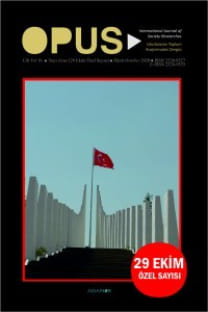‘İşgal Edilmiş Devlet’: Modern Devletin İkili Yapısı Üzerine Kavramsal Bir Bakış
Derin Devlet, Bürokratik Vesayet, Yetki Gaspı, İşgal Edilmiş Devlet.
The Occupied State: A Conceptual View on the Dual Structure of the Modern State
Deep State, Bureaucratic Tutelage, Assumption of Authority, Occupied State,
___
- Andıç, F., Andıç, S. ve Koçak, M. (2010). İbn Haldun: Hayatı ve Eserleri Üzerine Düşünceleri. Ankara: Kadim.
- Bartelson, J. (1995). A genealogy of sovereignty. Cambridge: C Univ Press. Briscoe, I. (2008). The proliferation of the “Parallel state”. FRIDE Working Paper, no. 71.
- Fraenkel, E. (1941). The dual state: A contribution to the theory of dictatorship. New York: Oxford University Press.
- Gutmann, A. ve Thompson, D. (1996). Demoracy and disagreement. Cam-bridge MA: Harvard Univ Press.
- Hirst, P. (1987), Carl Schmitt's decisionism. Telos, 72.
- Lauth, H. (2000). Informal ınstitutions and democracy. Democratization, 7/4, 21-50.
- Locke, J. (2012). Yönetim üzerine ikinci inceleme: sivil yönetimin gerçek kökeni boyutu ve amacı üzerine bir deneme. F. Bakırcı (çev.) 2. Baskı. Ankara: Ebabil.
- Morgenthau, H. (1962). The decline of the democratic politics: politics in the twentieth century, vol. 1. Chicago: University of Chicago Press.
- Pozen, D. (2010). Deep secrecy. Stanford Law Review, 62/ 2.
- Sabuktay, A. (2010). Devletin yasal olmayan faaliyetleri. İstanbul: Metis.
- Scheppele, K. L. (1988). Legal secrets: equality and efficiency in the common law. Chicago: Univ of Chicago Press.
- Schmitt, C. (1996). The concept of the political, Chicago: Univ of Chicago Press.
- Scott, P. D. (1993). Deep politics and the daeth of JFK. Berkeley: Univ of Cali-fornia Press.
- Scott, P. D. (2007). Deep politics ii: essays on Oswald, Mexico, and Cuba. NY: Marry Ferrell Foundation Press.
- Scott, P. D. (2008). The war conspiracy: JFK, 9/11, and the politics of war. NY: Mary Ferrell Foundation Press.
- Söyler, M. (2013). Informal institutions, forms of state and democracy: the Turkish deep state. Democratization, 20/2.
- Söyler, M. (2015). The Turkish deep state: state consolidation, civil-military re- lations and democracy. London: Routledge.
- Strong, T. B. (2007). Foreword: dimensions of the the new debate around Carl Schmitt. T. B. Strong (Der.), C. Schmitt the Concept of the Politi-cal. Chicago: Univ of Chiago Press.
- Tunander, O. (2009). Democratic state vs. deep state: approaching the dual state of the west. Eric Wilson (der.), Government of the Shadows içinde (ss. 56-72). London: Pluto Press.
- Tunander, O. (2012). Dual state: the case Sweden. Eric Wilson (Der.), The Dual State: Parapolitics, Carl Schmitt and the national security complex içinde (ss. 171-192). London: Ashgate.
- Valenzuela, S. J. (1990). Democratic consolidation in post-transitional set-tings: notions, process, and facilitating conditions. Kellog Institute Working Paper, No. 150.
- Weaver, O. (1995). Securitization and desecuritization. R. D. Lipschutz (Der.), On Security. NY: Columbia University Press.
- Weber, M. (2006a). Devlet ve zor kullanma. M. Rosen ve J. Wolff, (Der.), Siyasal Düşünce, S. Çalışkan ve H. Çalışkan (Çev.) içinde (ss. 84-85). Ankara: Dost.
- Weber, M. (2006b). Bürokratik yönetim. M. Rosen ve J. Wolff (Der.), Siyasal Düşünce, S. Çalışkan ve H. Çalışkan(çev.) içinde (ss. 156-8). An-kara: Dost.
- Weber, M. (2011). Bürokrasi ve otorite. Ankara: Adres Yayınları.
- Weber, M. (2012). Ekonomi ve toplum. İstanbul: Yarın.
- Wilson, E. (2012). The concept of the political. E. Wison (Der.), The Dual State: Parapolitics, Carl Schmitt and the National Security Complex içinde (ss. 1-28). London: Ashgate.
- Yayla, A. (2003), Siyasi düşünce sözlüğü. Ankara: Liberte Yayınları.
- ISSN: 2528-9527
- Yayın Aralığı: 12
- Yayıncı: ADAMOR Toplum Araştırmaları Merkezi
Hemşirelik 1. ve 4. Sınıf Öğrencilerinin Yaşlı Ayrımcılığına İlişkin Tutumları
İsmail Yelpaze, Ayşe Sibel Türküm
Suriyeli Mülteci Kadınların Kuma Dramı: Kilis İli Örneği
İpek AGCADAĞ ÇELİK, Feride VURAL
Ayman Saleh, Serdar Aydin, Orhan KOÇAK
Mehmet Ertuğrul UÇAR, Bilge Konal
19. Yüzyıl Sonrası Yeni Sosyal Hareketler
